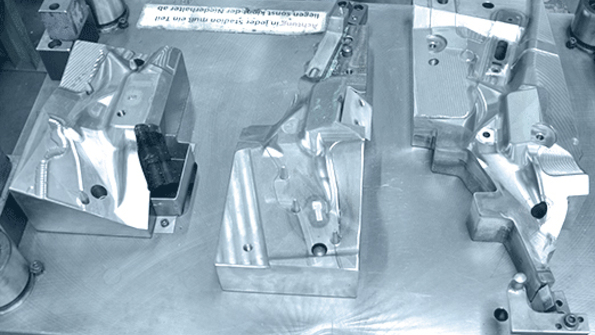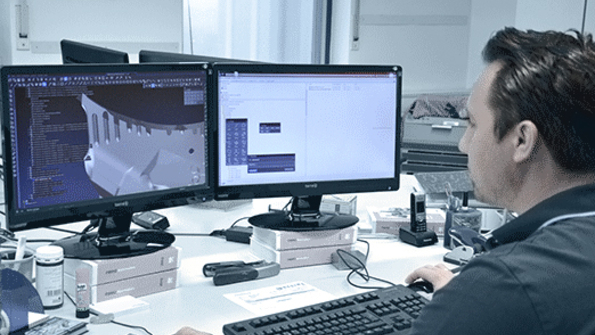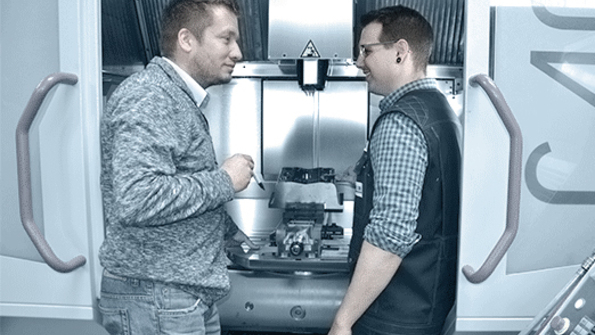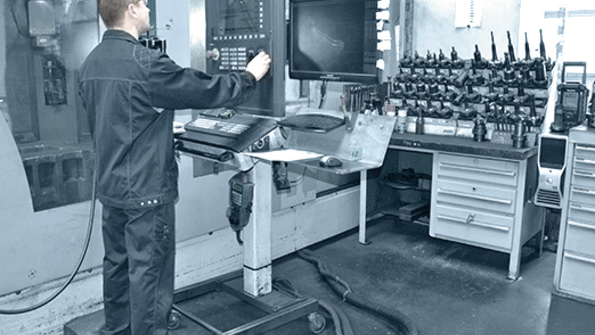-
Software
-
CAM software
- Tebis Automill
- CNC programming
- CNC automation
- CNC simulator
- Multiple setup
- Robotic machining
- CNC drilling
- Deep-hole drilling
- Combined turn-milling
- CNC turning
- Turn-milling
- 2.5D milling
- 3D milling
- 5-axis milling
- Slot milling
- Trimming
- HPC milling
- HFC milling
- Circle-segment cutters
- Sinker EDM
- Wire EDM
- 3D laser cutting
- Laser hardening
- Laser weld cladding
- CAD software
- CAQ software
- MES software
- Products
-
CAM software
- Services
- Consulting
- Sectors
- References
- Company
- News

-
 Home References
Home ReferencesPrecise forming with Tebis
Merima Präzisions-Werkzeugbau GmbH in the Swabian town of Brackenheim specializes in complex stamping and progressive composite tools. The company is primarily active in the automotive industry and accompanies its customers through the entire process chain from part development to series production. The die manufacturer has special experience with transfer dies in sheet metal working. Our commitment: Creating dies of the highest quality. Merima has used Tebis software to do this since 1996.
Company
Merima Präzisions-Werkzeugbau GmbH
Location
Brackenheim, on your computer
Focus
Process analysis by Tebis Consulting, morphing with Tebis BREP, active surface preparation, automation with Tebis templates, low-personnel manufacturing, process libraries and standards
Benefits:
- Reduced tryout time with excellent active surface preparation
- Fast and reliable manufacturing thanks to automation
- Easy, repeated and reliable work with process libraries
Sector
Die manufacturing
Published
2017

Interviewee: Björn Wind, Team leader for work preparation and NC manufacturing

Tebis has helped us to improve our overall production process; we have become faster and more flexible and we now manufacture more efficiently and reliably. All this thanks to the high consistency of the software, which no one else can offer in this form.
Merima Präzisions-Werkzeugbau GmbH, Germany
What used to take a week, we can now accomplish in a single day using Tebis Morphing, and the need for manual reworking has gone down.
Merima Präzisions-Werkzeugbau GmbH, GermanyThe path to profitability
The family-owned company, founded in 1988, currently has about 40 employees. The machine shop comprises seven machines, including two gantry milling machines and several 5-axis machining centers and presses. In 2013 Merima was acquired by GSU Stanz- und Umformtechnik GmbH in Ludwigsburg, Germany, and extended its portfolio with the manufacturing of smaller dies and series production. This was not only a challenge for the business, but also for design and manufacturing. Merima consistently developed this new line of business. The company successfully worked its way out of a tricky economic situation with its newly established capacity in mechanical manufacturing. "It was hard work, but it was worth it; we're now in the black," stresses Björn Wind, team leader for work preparation and NC manufacturing at Merima.
 Merima specializes in die sizes of up to 1500 mm and series production.
Merima specializes in die sizes of up to 1500 mm and series production.Björn Wind has worked for the precision die manufacturer since 1999 and helped implement many changes there. His greatest concern is the fear of tunnel vision within the company: "Always doing things the same way makes you quickly lose touch." To prevent this from happening, he is open to change and appreciates the outside viewpoint. Tebis Consulting has been providing the company with this viewpoint since 2006. Tebis consultants analyzed all processes and identified opportunities for improvement. One thing in particular was problematic at that time: The manufacturing process was repeatedly impeded by uncertainty regarding responsibilities. This was improved by the introduction of clear responsibilities and assigned roles so that tasks can now be clearly delegated. Tebis also implemented process libraries and standardized programming to prevent production errors from the start and simplify procedures.
High-quality and precise manufacturing
The processes of work preparation and workflow control are especially important at Merima in order to structure manufacturing processes as optimally as possible. "Our goal is production with zero errors," says Wind. To achieve this, employees maintain extensive requirement specifications in which they evaluate each part, summarize manufacturing groups and prepare assignment plans for machines as well as for manual tasks. "This enables an end-to-end process chain, so that we can quickly bring parts from development to manufacturing."
The highest possible surface quality is a must for demanding customers in the automotive industry. The die manufacturer uses the Autoform simulation software to develop workpieces for sheet metal forming. "We frequently have to import data from this to Tebis, which always works correctly," says Wind. In the past, working with surfaces was a true bottleneck: Importing meshes, incorporating modifications and performing reverse engineering calculations—all required great effort. Despite this, a good deal of manual reworking was still necessary. "What used to take a week, we can now accomplish in a single day using Tebis BRep Morphing, and the need for manual reworking has gone down," Wind reports. "Good active surface preparation also significantly reduces our tryout time."
 Lars Weiß, head of development and design, works with Tebis BRep Morphing on a daily basis.
Lars Weiß, head of development and design, works with Tebis BRep Morphing on a daily basis.Speed and reliability through automation
For the team leader, an application must be easy to use and simplify the work. During design, Merima tries to use good programming that is as simple as possible. The reason: This way, two employees don't have to perform the same tasks – with differing results. What is extremely helpful here is the continuous automation with Tebis templates that define the methodology. "This improves our reliability and gives us a noticeable advantage in speed," stresses Wind. Merima uses templates for all machining-types, including ruled features for 2.5D for simple and exact NC programming. All features are linked with an exact machining specification in which the correct milling strategies are already stored. The programmer only needs to select the appropriate template. This automation promoted low-manpower manufacturing at Merima: Previously, five programmers worked on three machines in three shifts. Now, only two programmers work with seven machines in two shifts.
 Björn Wind and Immanuel Haß examine a workpiece on the Hermle C400U 5-axis machining center.
Björn Wind and Immanuel Haß examine a workpiece on the Hermle C400U 5-axis machining center.Manufacturing expertise in digital form
Precise sheet-metal forming requires a great deal of experience and technical knowledge. Consequently, Merima started using knowledge bases early on. "Anyone not documenting their manufacturing knowledge is simply burning money," according to Wind. The Tebis process libraries were very useful to him. Tebis implementation setup tool libraries and standards at Merima. "We went through everything once in great detail and carefully stored it. Now everything runs correctly and quickly. And our library is growing every day," Wind emphasizes. For example, the actual tools used and their data are centrally stored in Merima's tool libraries with proven manufacturer parameters and original cutting data. They can be easily and repeatedly accessed by employees.
 The Tebis Viewer gives employees a clear overview of all the important information. Any changes are a very rare occurrence.
The Tebis Viewer gives employees a clear overview of all the important information. Any changes are a very rare occurrence.In addition, tool groups were set up so that each machine has the same 30 tools in the first positions. The benefit: 100% availability. This significantly simplifies selection and exchange and saves time. Furthermore, neither programmers nor machine operators have to give any thought to whether a tool is actually available at the desired time.
Tebis Implementation also prepared specially configured postprocessors for Merima to improve process reliability. In the first three projects, the team leader was still highly skeptical as to whether the toolpaths would actually be correctly output. But he quickly realized: It works perfectly. "Tebis has helped us improve our entire manufacturing process. We've become faster and more flexible, and manufacture more efficiently and reliably. This is all possible thanks to the high consistency of the software, on a level that no others provide," concludes Björn Wind.



